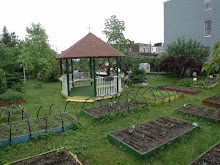TELEVISION REVIEW
Jamie Oliver aims to make school lunches more healthful
In 'Food Revolution,' the British chef hopes to overhaul the menu in Huntington, W.Va.
March 20, 2010|By Mary McNamara television critic
In the film “We Are Marshall,” the town of Huntington, W.Va., reels, then regroups after most of Marshall University's football team is killed in a plane crash. Forty years later, Huntington is at the center of yet another potential turn-around tale. Only this time, rather than a phoenix emerging from the ashes, the image is more of a grilled chicken breast rising from a landfill of deep fryers.
In "Jamie Oliver's Food Revolution," the boyish and preternaturally media-friendly British food guru known for a while as "The Naked Chef" because of his penchant for simple food, comes to Huntington in the hopes of transforming the unhealthiest town -- i.e. the fattest town -- in America. After overhauling the menus for the British school system, and with half a dozen TV shows to his credit, Oliver seems just the man for the job.
After a brief wrangle with a hostile local radio talk show host, he attempts to slay the dragon of the local school lunch. It's a brilliant move, narratively speaking. Not only do we meet all the fabulous "lunch ladies," including one Alice Gue, who I am fairly certain ran my elementary school cafeteria, but we also discover there isn't a person alive who won't joyfully bash school cafeteria food.
When Oliver arrives, the kids are all enjoying a hearty breakfast of pizza and/or sugary cereal doused in chocolate or strawberry milk.
"I've never seen pizza served for breakfast," Oliver says in horror (and a tiny bit of hypocrisy -- his website includes a pizza he calls "perfect" for breakfast, although it does include grapes and pine nuts, which the Huntington breakfast pizza most certainly does not.)
Despite an accent that is usually referred to in the U.K. as "mockney" and the product-tousled hair men of his age inexplicably favor, Oliver is eminently and instantly likable. He may in fact wind up being reality TV's most engaging star, equally comfortable talking to people and the camera, capable of evoking and handling an emotional moment with a winning combination of self-confidence and humility.
(It would be nice if he could stop referring to the cafeteria cooks as "girls," but this will undoubtedly be pointed out to him as the season develops -- the look Gue gives him when he refers to her as "lunch lady" practically freezes the camera lens.)
Many of the people Oliver meets in the first episode are, of course, skeptical, bordering on hostile. This being TV, it's difficult to know how much of the tension is scripted -- obviously Huntington invited Oliver and his experiment -- but that doesn't mean the issues Oliver is dealing with aren't real.
No matter where you live, processed food is cheaper and easier to prepare than fresh, and the reason cafeteria food is unhealthful is often because of cost, ease of preparation and children's natural aversion to anything that doesn't include a dipping sauce.
The schools are just the first step in Oliver's revolution. He also plans to teach the community how to prepare healthful meals that "don't cost the earth." As a first step, he takes over the kitchen of the Edwards family, cooking the food they had eaten the previous week -- a table-buckling assortment of fried, refried and heated junk that stands before the mother in greasy accusation. "This food will kill your kids," he tells Staci as her eyes fill with tears.
It's a highly orchestrated moment, but effective nonetheless. As Oliver points out, Huntington is only a few percentage points worse than many other parts of the U.S. And though my family does not own a deep fryer and banished corn dogs years ago, I'm betting I won't be the only mother who surveys the contents of her freezer with growing alarm before racing out to buy fresh vegetables.
So it has the potential to be powerful stuff, "Jamie Oliver's Food Revolution," to show rather than tell, to offer a healthful alternative for people without a lot of money or free time, people who do not view heirloom tomatoes or regular use of buckwheat as status symbols.
Still, it's tricky work being a savior. In addition to his small media empire, Oliver runs a program that trains at-risk kids to become chefs, so he does put his money where his mouth is. But when he offers one of the Edwards boys a few one-on-one lessons in the kitchen and possibly a future as one of his chefs, the boy's eyes light up, reminding us and, one hopes, Oliver, that it isn't just junk food weighing down small-town America, but it's also a loss of jobs and possibility.
Like it or not, Oliver represents more than just healthful eating -- as he has made clear in countless interviews, he is a small-town boy who didn't do well in school. But with some talent in the kitchen, a lot of personal magnetism and hard work, he has managed to become rich and something of a hero.
That kind of magic is radiant, tantalizing, and difficult to teach.
Copyright 2010 Los Angeles Times












No comments:
Post a Comment